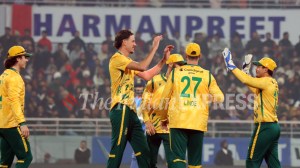The Union Cabinet’s nod to the Ram Nath Kovind-led high level committee’s proposal for One Nation, One Election, initiating the process for simultaneous polls across the country, is a signal to detractors of the Narendra Modi government that it remains on course to implementing its agenda – the setback in the Lok Sabha elections notwithstanding.
Sources said the government was clear about pressing ahead despite the realisation that the process is going to be “elaborate” and would need the support of parties in the Opposition too, to clear Parliament.

Sources said that the government is open to referring the Bill to a Joint Parliamentary Committee once it is introduced to evolve a consensus. “There could be modifications to the original proposals as well,” a top leader said.
On Wednesday, briefing the media on simultaneous polls, Union minister Ashwini Vaishnaw said detailed discussions would be held on various fora across the country over the next few months.
The Kovind panel had submitted its recommendations for One Nation, One Election earlier this year, before the Lok Sabha polls. The contours of Parliament have changed since, with the BJP not enjoying a simple majority in either House.
On Wednesday, the TDP, which is now the biggest group sustaining the BJP in power, came out in support of One Nation, One Election – but with a rider. The party had not clarified its stance earlier on the issue, and had not made any submission to the Kovind panel.
TDP parliamentary party leader Lavu Srikrishna Devarayalu told The Indian Express: “We welcome the idea of simultaneous elections.
Story continues below this ad
But like the minister said (at the briefing on the Cabinet decision), it calls for broad discussions. We want it to be discussed on every platform – every booth, every mandal… Feedback has to be collected on the pros and cons.”
Significantly, Devarayulu added: “We have to also see if simultaneous polls would save as much money as is portrayed.”
The curtailing of expenses has been one of the government’s main arguments in favour of simultaneous polls.
The ruling party, however, is confident that many Opposition parties will do a rethink in the process of discussions. “Since it is a proposal on which you cannot allege a divisive agenda or Hindutva agenda, we hope maximum parties will come around. We think we can build a consensus gradually as the idea is good for the country. A Joint Parliamentary Committee or a Standing Committee platform can provide that opportunity,” a BJP leader said.
Story continues below this ad
Modi first spoke about One Nation, One Election soon after coming to power in 2014, and while it remains on his government’s agenda, it is unlike the party’s pet ideological goals such as the Ram Temple in Ayodhya, the abrogation of 370 or Uniform Civil Code, point out party sources. “Still, if the proposal goes through, it will leave a remarkable legacy for PM Modi,” a source said.
The leader pointed out that even the introduction of a Bill for One Nation, One Election alone helps the BJP, which is fighting the Opposition narrative that, “weakened” after the Lok Sabha results, the Modi government has been forced to go slow on proposals such as the waqf Bill.
“It has a twin advantage – the BJP can signal that the government and its reforms are on the track, and it can rally its middle class support base which has expressed its distaste for frequent elections. The Prime Minister wanted such a non-divisive governance issue to be taken up to demonstrate that the government was unfazed, notwithstanding the Opposition’s attack over the drop in our numbers,” said the source.
To mark the completion of the first 100 days of the Modi government’s third term, its top ministers came forward to underline that all its agendas were on track despite the Lok Sabha poll setback. A senior government functionary said earlier this week that there was no area where the government had not taken policy decisions to continue the work it had initiated 10 years ago.
Story continues below this ad
In the current Lok Sabha of 543 MPs, the NDA has 293 members, while in the Rajya Sabha of 234 MPs, the NDA has 121 members backing it (including the six nominated members).
Among the Opposition parties, the Congress, TMC, DMK, Samajwadi Party, Aam Aadmi Party, and Left had opposed One Nation, One Election in their responses to the Kovind panel. The BSP, which had also opposed the move, has now come around to supporting it.
On Wednesday, after the Cabinet cleared the proposal, several BJP allies extended their support for One Nation, One Election.
JD(U) chief spokesperson Neeraj Kumar told The Indian Express: “We fully support the Union Cabinet’s decision as we believe that simultaneous Lok Sabha and Assembly elections would save election expenses and expedite development works, which are obstructed because of model code of conduct being in place because of some elections or the other… Those criticising it should know that we followed One Nation, One Election till 1967.”
Story continues below this ad
Union Minister for Food Processing and LJP (R) chief Chirag Paswan called it a “historic step”. He posted on X in Hindi: “One Nation, One Election will strengthen the country’s democratic process, reduce election expenses, and accelerate development projects. Additionally, it will increase transparency in elections and reduce the financial burden on the government exchequer. It will also simplify the role of paramilitary forces, police, and administrative officials from a security perspective.”
Shiv Sena (Shinde) MP Shrikant Shinde called it “a game changer”. “This Cabinet decision marks the dawn of a new era for our democracy. Simultaneous elections across the nation will not only drastically reduce administrative and financial burdens but also ensure that governments can focus on long-term governance instead of being repeatedly disrupted by election cycles. It’s a crucial reform that aligns with India’s vision of progress and stability,” Shinde said.
The Jayant Chaudhary-led Rashtriya Lok Dal (RLD) termed it a “practical” move. “This will reduce the economic burden of elections. It would make election management easier,” RLD national secretary Anupam Mishra told The Indian Express.
HAM (S) patron and Union Minister for Micro, Small and Medium Enterprises Jitan Ram Manjhi said that PM Modi was “destined to make bold and landmark decisions”.
With inputs from Santosh Singh, Asad Rehman

































